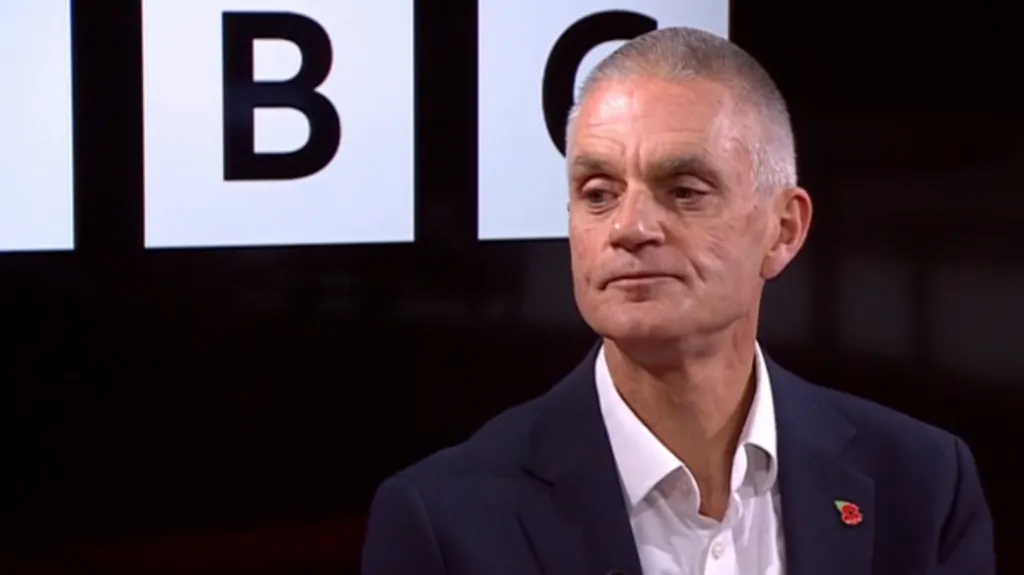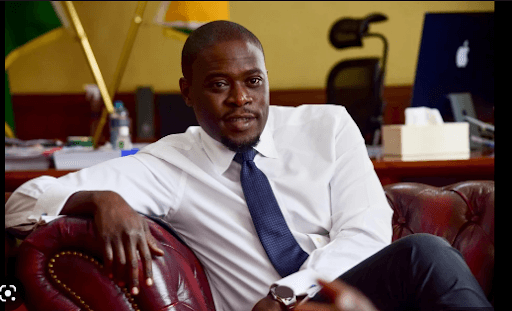
BBC director general Tim Davie has told staff that "we've got to fight for our journalism" after Donald Trump threatened to sue the corporation for $1bn (£760m) over a Panorama programme.
It comes after a leaked internal BBC memo, published by the Telegraph last Monday, said the film had misled viewers by splicing together parts of the US president's speech on 6 January 2021 and made it appear as if he had explicitly encouraged the Capitol Hill riot.
Davie, who resigned on Sunday alongside BBC News CEO Deborah Turness after mounting pressure over the memo, told a staff call on Tuesday: "We have made some mistakes that have cost us, but we need to fight."
"This narrative will not just be given by our enemies, it's our narrative," he added.
He said the BBC went through "difficult times… but it just does good work, and that speaks louder than any newspaper, any weaponisation".
Trump threatened to take legal action if the BBC did not make a "full and fair retraction" of the programme by Friday.
The BBC has said it will reply in due course.
BBC chair Samir Shah said in a letter to the Culture, Media and Sport Committee (CMS) on Monday that the corporation would like to apologise for the edit, which he called an "error of judgement" which gave the impression of a "direct call for violent action".
He also defended the BBC against other concerns raised in the memo, which included reporting by BBC Arabic on the Israel-Gaza war and coverage of trans issues - saying it was "simply not true" the BBC had buried them or failed to act.
Neither Davie nor Shah, who joined the call, mentioned the legal threat in Tuesday's staff call.
Davie gave three reasons for his decision to quit, including the fact that "there was an editorial breach and I think some responsibility had to be taken".
He also cited the upcoming charter renewal - saying he wanted to give his successor a "runway into that" - and the personal pressures of the role.
"It's a pretty relentless job. It keeps coming."
Shah likewise described the rigours of the role, adding that "the way we as a country attack people really personally is not good".
"Why would somebody of huge talent do this job if that's what they face?"
Shah also defended the fact that the corporation did not respond to memo's publication for seven days.
"We had a deadline, that was Monday... and we met that," he said, referring to the deadline given by the CMS.
He said he understood people's frustration, but that he needed "to be careful and get it right" or the BBC would "never be forgiven".
Shah dismissed claims that the dual resignations were the result of "plotting", saying they were "fanciful".
"I don't believe in conspiracy theories, I'm a journalist."
No timeline was given for selecting Davie's replacement, but Shah said the corporation was in "succession mode".
Trump's legal team wrote to the BBC on Sunday threatening to take action over the "false, defamatory, disparaging, misleading, and inflammatory statements" in the Panorama programme.
The letter calls for an apology and for the BBC to "appropriately compensate" the president.
Trump's attorney Alejandro Brito also accused the BBC of defamation under Florida law.
The programme, which was first broadcast on 24 October 2024, is not available to watch on iPlayer - which the BBC noted on Monday was because it was "over a year old".
Some current affairs programmes including Panorama are only kept on the service for 365 days.
In his speech on 6 January 2021, Trump said: "We're going to walk down to the Capitol, and we're going to cheer on our brave senators and congressmen and women."
In the Panorama programme, he was shown saying: "We're going to walk down to the Capitol... and I'll be there with you. And we fight. We fight like hell."
The two sections that were stitched together were originally more than 50 minutes apart.
Media lawyer Mark Stephens said it would be difficult for Trump to bring the case in the US, since his team would need to prove the programme had been shown there.
"Panorama wasn't broadcast in the USA, and BBC iPlayer isn't available… so it's not clear that any US court would have jurisdiction to hear the claim," he told BBC Breakfast.
Stephens added that he did not feel this was "the particular legal hill [Trump] wants to die on," should it go to court.
"Every damning quote that he's ever uttered is going to be played back to him and picked over - not great PR."
George Freeman, a former assistant general counsel for The New York Times, described numbers cited in legal complaints in the US - such as the $1bn in Trump's - as "totally meaningless" and "empty".
"It's so meaningless that when I was at the New York Times, we had a policy that the paper wouldn't print the amount sued for," he told the BBC's World Tonight programme.
He explained that in the US, Trump's team would need to prove a "gross distortion" of his meaning, that the edit harmed his reputation, and that it "was done intentionally to create a different meaning".
The unprecedented joint resignations at the BBC came after growing pressure following the publication of the leaked internal memo - written by a former independent external adviser to the broadcaster's editorial standards committee, Michael Prescott.
Announcing his resignation on Sunday, Davie said the "current debate" around the corporation was not the only reason for his decision to step down, but "understandably contributed" to it.
"Overall the BBC is delivering well, but there have been some mistakes made and as director general I have to take ultimate responsibility."
Outgoing BBC News CEO Deborah Turness, who resigned alongside Davie, insisted on Monday the corporation was not "institutionally biased".
A spokesman for Sir Keir Starmer said on Monday the prime minister did not believe the BBC was "institutionally biased".
No 10 also denied the BBC was "corrupt" - a word Trump used to describe some of its journalists over the Panorama programme.
Meanwhile, Sir Robbie Gibb, a former senior editor at the BBC who was director of communications for Theresa May in Downing Street, has faced calls to be removed from the BBC board.
Writing in the Guardian, Liberal Democrat leader Sir Ed Davey said "rightwing populists have been attacking the BBC for years".
To ensure the BBC's independence and impartiality, Sir Robbie should have no role in appointing the new director general, he wrote.
"The government should remove him from the board immediately - and end the practice of political appointments, which so badly undermines the BBC, altogether," he said.
Sir Robbie has not responded.
Conservative leader Kemi Badenoch said the focus should be on the mistakes made "rather than chasing people because of their political opinions".
Former Conservative MP Sir Jacob Rees-Mogg told the BBC's Newsnight programme that the government should stay out of the latest controversy "because the BBC wants to maintain its independence from the government".
Asked about the US president's threat of legal action, he said: "I would have thought it would be sensible for the BBC to settle with Donald Trump... It won't be a billion, it will be some lesser amount."
Reform UK leader Nigel Farage, who claimed the BBC "has been institutionally biased for decades", said he spoke with Trump on Friday, telling a London news conference: "He just said to me: 'Is this how you treat your best ally?'".













